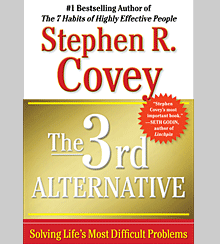Strategic Management and Innovation SolutionsIn my 35-year corporate journey and my 60-year life journey, I have consistently found that the thorniest problems I face each day are soft stuff — problems of intention, understanding, communication, and interpersonal effectiveness — not hard stuff such as return on investment and other quantitative challenges. Inevitably, I have found myself needing to step back from the problem, listen more carefully, and frame the conflict more thoughtfully, while still finding a way to advance the corporate agenda empathetically. Most of the time, interestingly, this has led to a more promising path forward and a better relationship, which in turn has made the next conflict easier to deal with.
Stephen Covey provides a more direct approach to successful problem solving in the excerpt below from his new book. From the outset, his “3rd Alternative” approach engages everyone involved in an issue to advance the agenda in a winning way. The soft stuff will forever be the hard stuff, but leveraging 3rd Alternative thinking can make the soft stuff significantly easier to resolve productively.
— Douglas R. Conant
An excerpt from Chapter 3 of The 3rd Alternative: Solving Life’s Most Difficult Problems
If you’re a 3rd Alternative supervisor, you’ll neither flee nor fight. You’ll look for something better [when conflict arises], a solution that will provide your employee with a huge emotional payoff and create for the firm new and significant value.
A friend of mine explained how a 3rd Alternative leader dealt with exactly this situation in his life:
I was new at the job and had come in hoping for a better salary. I settled for something a lot less than I’d hoped for just to get in the door. But after a couple of months, it was clear that my family was struggling. We couldn’t get by because of some medical expenses. Besides that, I felt more and more that I was getting paid too little for the work I was doing. So I took a real risk and went to talk to the big boss about a raise. I didn’t know her very well and she didn’t know me. I had no real track record yet with that company.But she invited me into her office and I explained why I was there. I was kind of surprised when she said, “Tell me more.” I told her about my family situation. She just listened, and I talked quite a lot about what I’d been doing for the firm. She asked me what I thought about the company, its customers, its products. It was odd. We had this long conversation that I thought was going to be about my pay, but instead was about me — how I was doing, what I thought, what I’d learned in my few months at the company.Then she asked me about a certain customer I’d been working with. She wanted to know my ideas for expanding our business with that client, and I actually did have some thoughts that I shared.A couple days later, she invited me back into her office. Three or four other people joined us, and she had put up on a whiteboard my ideas for this client. We had quite the discussion, and a lot more discussions after that. I was excited. Finally, they offered me an expanded job with higher pay and responsibility for a new level of service to this important client.For my friend, these discussions were just the beginning of a swift rise in that company; he eventually became a partner to the “big boss.”
I’ve rarely heard of a wiser leader than this woman. She had a fine capacity for 3rd Alternative thinking. How easy it would have been for her either to fight my friend or just to give in to his request. Instead, she sensed the possibility of a dramatic win-win. Rather than haggling over the existing pie, she could envision the prospect of a much bigger pie. She suspected that combining my friend’s needs and energies with the client’s needs might well produce growth for everyone. The eventual result was a whole new line of business and a partner who increased his worth to the company every year. From what I know of this young man’s contribution to his firm, he was ultimately responsible for doubling its size. via strategy-business.com
Traditionally, when facing low-cost competition companies try to cut costs or innovate. This trap leads them in never-ending cycles of competitive disadvantage. Survival requires smarter and subtler responses. Contact InnoThink Group to discuss your options or call 719-649-4118. We are a leading Strategic Management and Innovation Consulting Firm.

No comments:
Post a Comment